Director Reveals Why Steven Seagal “Was a Pain in the Neck” to Work With
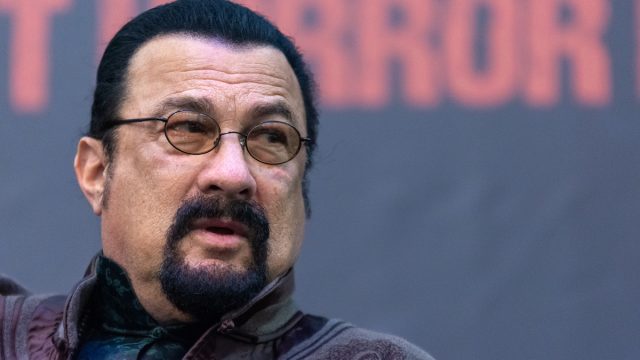
Add this filmmaker to the growing list of co-workers who have spoken out about their negative experiences with Steven Seagal. In a new interview with Yahoo! in honor of the 30th anniversary of The Fugitive, director Andrew Davis looked back on working with the controversial action star on two movies: Seagal’s 1988 debut Above the Law and 1992’s Under Siege. According to the director, they had a fine working relationship on Above the Law, but by the time they reunited four years later, he found the martial artist to be “a pain in the neck.” Read on to see why Davis and Seagal clashed that time around and to find out what some of Seagal’s other collaborators had to say about him.
RELATED: Steven Seagal Is “Ludicrous in Real Life,” Co-Star Brian Cox Said.
Davis directed Seagal in his movie debut.
Above the Law, released in 1988, was Seagal’s first feature film. He starred as a police officer who also happens to be an aikido expert. As reported by Yahoo!, at the time, Seagal was a martial arts instructor in Hollywood. One of his students was the agent Michael Ovitz, who thought his teacher could be a movie star.
“I had a meeting with Warner Bros., and they said: ‘We want you to meet this guy, Steven Seagal,'” Davis told Yahoo! “I was like, ‘Who is Steven Seagal?'” Davis then met with the man himself. “[H]e said, ‘I saw Code of Silence and I want you to direct my movie.’ I went, ‘Well… can you act?’,” he recalled.
After doing a screen test with Seagal, the studio decided to move forward with this new phase of his career. “Above the Law came out and Steven became a big star overnight,” Davis said. “He didn’t look like anyone else with that ponytail and the aikido moves. It really launched him.”
They reunited for another film.
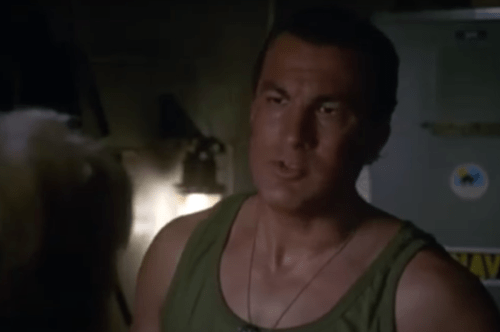
By four years later, Seagal had established himself as a big action star. That’s when he and Davis collaborated again, this time on Under Siege. In this one, Seagal plays a former Navy SEAL, who has to fight off an invasion on a battleship.
Unlike in their first team-up, Davis said that he did not enjoy directing Seagal that time around. “He was a pain in the neck,” the 76-year-old said. “He had become arrogant. Tommy Lee [Jones] is actually in a lot more of Under Siege than Steven Seagal! But it all worked out: Under Siege became Seagal’s biggest movie, and it got me The Fugitive.”
Davis worked with Jones once again, as well with star Harrison Ford, on the 1993 hit The Fugitive. The movie, based on the ’60s TV series, was nominated for seven Academy Awards and won one: Best Supporting Actor for Jones.
For more celebrity news delivered right to your inbox, sign up for our daily newsletter.
Davis was more diplomatic about Seagal in a previous interview.
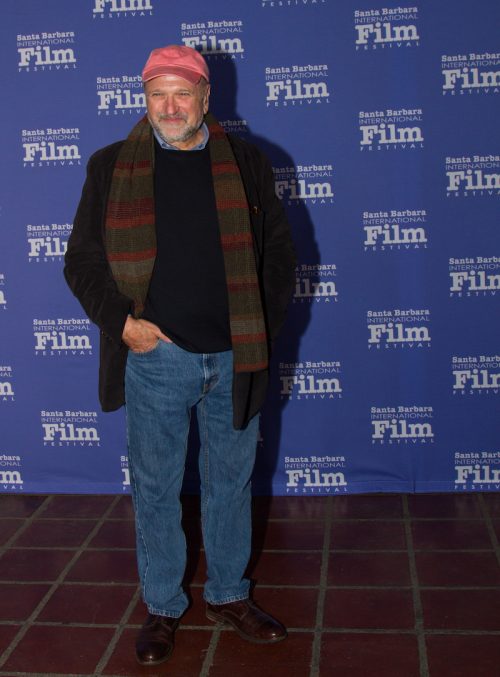
In 2013, Davis addressed his Seagal collaborations in an interview with Mandatory. Asked about working with the actor for a second time, the director responded, “Well, [Warner Bros. executive] Terry Semel wanted us to get back together again, yeah.”
The interviewer prompted, “Sounds like the second time wasn’t a good experience?” to which Davis replied, “You’ll notice, he’s only in the movie 41 minutes. Tommy Lee is in the movie longer than Steven. It was fine, it was fine. It worked out well. We had a nice time down in Mobile and had a lot of fun making the movie, and that was the movie that got me The Fugitive so it was worth it.”
Another director called him “a nightmare.”
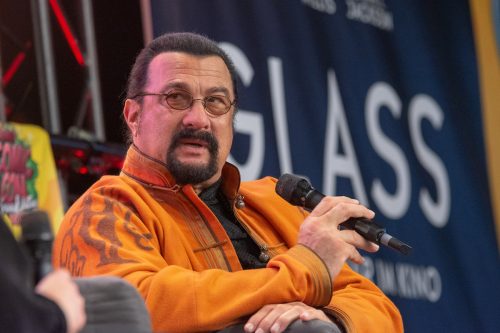
Other co-stars and directors have slammed Seagal for his attitude and behavior. Anthony Hickox, who directed Seagal in the 2005 movie Submerged, is one of them.
“He is a nightmare!” Hickox told Dread Central. “He’s impossible; he doesn’t turn up, he refuses to say any line that’s written, it’s just ridiculous. I sat back when I was making it and said, ‘I’m a better director than this,’ so I went back to what I like to do, which is write and direct horror.”
RELATED: 6 “Canceled” Celebrities Who Were Never Heard From Again.
He’s also been called “a bully.”
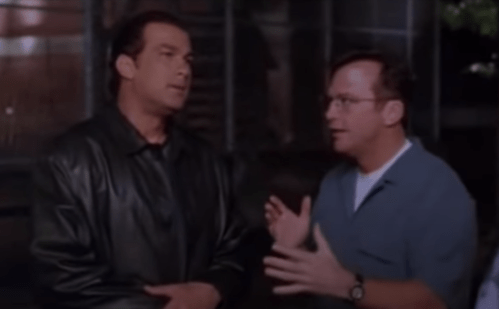
Seagal also isn’t very popular with actors who’ve worked with him. John Leguizamo, who co-starred with Seagal in 1996’s Executive Decision, called him “washed up” and a “bully” and claimed that Seagal initiated a physical altercation with him. Brian Cox, Seagal’s co-star in 1996’s The Glimmer Man, wrote in his memoir, “Steven Seagal is as ludicrous in real life as he appears on screen.”
Recently, Tom Arnold, who appeared with Seagal in 2001’s Exit Wounds, said he heard from a mutual friend that Seagal believes the comedian is being paid to badmouth him. Arnold, who had spoken positively about Seagal in the past, claimed to Entertainment Weekly in July, “I also know women that he’s done things to that are friends, that are in the business. I’m like, ‘Okay, well, [expletive] him. Really [expletive] him.'” The actor said that he now believes Seagal’s actions go beyond being an “[expletive] on the set.”
Along with the claims of him being hard to work with, Seagal has faced sexual assault and harassment allegations, which are what Arnold was referencing. When Seagal was asked about the claims during a 2018 interview with BBC Newsnight, he walked out.